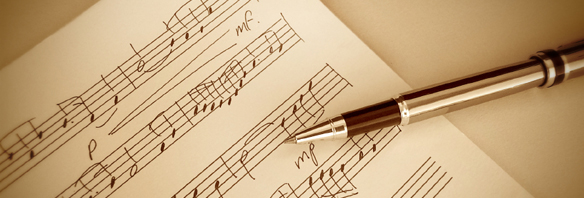 It’s strange how some instruments go in and out of favour in church music groups.
It’s strange how some instruments go in and out of favour in church music groups.
Our ears seem to be drawn to the same kind of instrumentation that we are used to hearing in mainstream popular culture. For example, in the 80s and 90s we were used to lots of saxophone: Baker Street (Gerry Rafferty), Careless Whisper (George Michael),Poirot (I mean the signature tune to Poirot, not that Poirot played the saxophone onCareless Whisper). But the sax has now largely disappeared from the pop scene. I’m sure that this is the reason that the sax has also disappeared from featuring on today’s Christian music CDs, leading it to being side-lined in church bands too.
A few strings
At the moment, the only classical orchestral instruments we hear on Christian music CDs produced in the West are a few strings. Everything else is electric or closely tied to folk music. So if it’s out with the saxophones, flutes and trumpets, it’s in with the banjos, Uilleann pipes, Dobros, fiddles, accordions and penny whistles (don’t worry — I don’t know what all of them are either.)
This can leave us church musicians feeling a bit out of it, because the majority of those who volunteer to help with music in churches play orchestral instruments. This is naturally the case because these are the instruments that people learnt at school.
I’m just as guilty of side-lining instruments that ‘don’t fit’. Rumour has it that I’m not fond of the clarinet. Just for the record, I use a clarinet sometimes for a Sunday morning service, though I admit that using the clarinet doesn’t confirm that I like the clarinet!
Using the gifts God has given
The point is that following stylistic trends can make us slaves to a certain sound. It’s not particularly healthy if we never ask the servant-hearted saxophonist in the congregation to play because that’s not the kind of sound that is wanted. The saxophone may make a come-back in another ten years’ time, but that’s not the only reason to encourage them to keep playing in church. Being a church musician is about learning to serve God’s people by using gifts he’s graciously given. If we see a keenness to serve, and the musician is skilful enough to lead a congregation well, then we are doing them and the wider church a disservice by standing them down.
The Men’s Convention band I played in a couple of years ago was laughed at by one of the overseas speakers for using ‘horns’ (trumpets and sax). This was a pity because the players served us all with humility and added a colour and light that is sometimes needed to drive the singing of 4,000 men. At the Evangelical Ministry Assembly a few years ago I also remember arrogantly suggesting to a brother that there wasn’t much place for a bassoonist in a contemporary church music group. I was rightly rebuked. A bassoon may not fit with our world’s definition of a music group, but the Lord’s definition of any group (musicians or not) is that they serve him humbly and that they serve his church sacrificially.
That’s why I use a clarinet. Not my cup of tea (OK, I admit it), but the person behind the clarinet is someone who is keen to serve Jesus, and who plays well enough to bring colour to the words we sing as a congregation without drawing attention to himself. That’s the ‘style’ of musician that Jesus wants. So please don’t be scared of using instruments that aren’t ‘in’ at the moment. We need to be growing servants of Jesus, not slaves to style.
Bagpipes in the morning!
Of course, it’s a good thing to be culturally sensitive — it’s not a great idea to pull out the bagpipes at an 8.30 am Book of Common Prayer service — but, if music is done well and sensitively, there’s no reason why any instrument can’t be played in a way that will bring honour and praise to God — even the clarinet!
Richard Simpkin is Director of Music at St. Helen’s Church, Bishopsgate, London.
This article was first published in the October 2013 issue of Evangelicals Now. For more news, artciles or reviews, subscribe to EN or contact us for more information.
http://www.e-n.org.uk 0845 225 0057

Reblogged this on sevennotesofgrace and commented:
It doesn’t matter what instruments you use, but the humility, sensitivity and the servant heart of the player does! I enjoyed the challenge of this post for music directors.